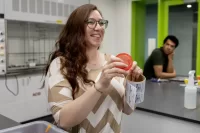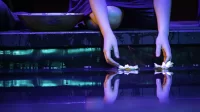Bates, Mount Holyoke awarded $65,000 for tech project
Bates and Mount Holyoke colleges have received a grant of $65,000 to fund the development of teaching tools in bioinformatics — the use of computing technology in biological research, such as gene mapping.
The National Institute for Technology and Liberal Education, a nonprofit organization that promotes the use of digital technology to enrich liberal-arts education, awarded the grant to the two colleges. The funds will support a three-part program that will enable faculty, staff and students from Bates, Mount Holyoke and other schools to develop course modules that make bioinformatics resources accessible to students.
The first part of the program is a two-day workshop at Mount Holyoke in May, in which staff from the National Center for Biotechnology Information will explain the use of existing bioinformatics tools and resources, such as its “Basic Local Alignment Search Tool,” a powerful, very complex search engine used in genomics and other biological research.
A retreat at Bates in June will allow faculty, information-technology staff and students from several schools to adapt information from the NCBI workshop for use in specific courses. The aim is to develop “toolkits” that will introduce such resources as BLAST to undergraduate students.
The third piece in the program is the publication of these teaching tools for broad academic use.
The two colleges applied for $35,000, but NITLE was impressed enough by the proposal that it offered an additional $30,000. Where participation in the Bates retreat program was originally intended to be limited to New England schools, the additional funds have allowed Bates and Mount Holyoke to give it a national scope.
The funding hike “widens the audience and widens the possibility of projects, so it was an excellent development,” says Michael Hanrahan, assistant director and instruction coordinator for Information and Library Services at Bates. “It’s a vote of confidence that speaks well to the combined talent and ability of the technical staffs and faculty” at the two colleges.
The grant comes as Bates plans the creation of a digital imaging center that will serve both the science and visual art curriculums. The center will provide, among other enhancements, highly advanced resources for research and the representation of data in the sciences.


